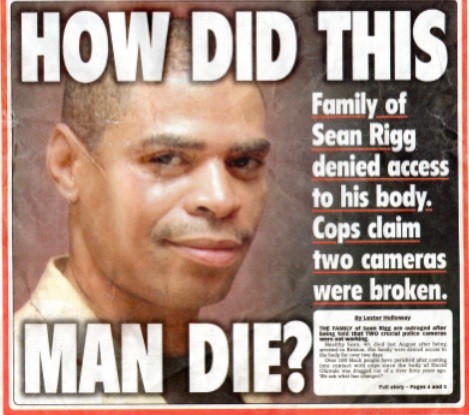Sean Rigg: Police Watchdog under Fire for Flawed Probe into Musician's Death in Custody
IPCC failed to examine Sean Rigg's death robustly and left family to uncover evidence themselves

The Independent Police Complaints Commission has been heavily criticised in a review of its investigation into a man's death in police custody. The report also accuses the Police Federation of "inappropriate conduct".
Sean Rigg, a musician, died after police used "unsuitable and unnecessary force" in arresting and restraining him, an inquest jury found after officers failed to uphold his basic rights. Police actions contributed to his death in south London in 2008, the inquest ruled.
An independent report ordered after the inquest said the police watchdog made a series of errors in its investigation of Rigg's death, which had cleared officers of blame.
The review said the IPCC failed to robustly examine evidence - including CCTV footage - and was hampered by a lack of resources.
Three officers are under criminal investigation over evidence they gave to the inquest. It was left to the Rigg family, assisted by the deaths-in-custody charity Inquest, to uncover the footage, which contradicted one officer's account.
Rigg, 40, was arrested after smashing up a gazebo at his hostel in Balham, south London. He suffered from paranoid schizophrenia, and was found walking bare-chested in the street, making karate moves. He died in Brixton police station later that day.
The IPCC's original investigation ruled that officers had acted reasonably and proportionately. Those findings came under heavy fire in the review, which was led by the criminologist Dr Silvia Casale. She uncovered a series of IPCC blunders, police errors and interference by the Police Federation.
Ruled out disciplinary action
Casale said: "We found that the IPCC investigation and report concerning the tragic death in custody of Sean Rigg in 2008 should have been more robust, in particular as regards its pursuit of lines of inquiry and critical analysis of the evidence."
The initial IPCC report ruled out disciplinary action but the review has now called for that decision to be reconsidered.
It said: "Based on the accumulated evidence following the inquest, the review recommends that the IPCC reconsider the conduct of the police officers involved in the apprehension, restraint and detention of Mr Rigg, in relation to possible breaches of their duty of care, with a view to determining whether to bring misconduct proceedings."
The review criticised the IPCC for accepting "improbable" and "implausible" accounts by police officers. Officers were allowed to confer before giving their initial accounts, it found.
"The arresting police officers should have been separated and instructed not to speak or otherwise communicate with each other about the events until the IPCC was able to take detailed initial statements from each," said the report.
Marcia Rigg, sister of Sean, said: "This report shows just how badly we were failed by the IPCC, not to mention the police. It is frightening to think that in the intervening years, as we struggled for justice, more families will have been failed in the same way.
"We hope that a complete re-investigation of the issues identified by the review, with new consideration of police misconduct and criminal proceedings, will take place as quickly as possible.
"The police and the Police Federation need to sit up and take notice of this report and get their own houses in order rather than obstructing the IPCC in its statutory role."
Police initially failed to respond to 999 calls but arrested Rigg after reports that he had attacked a man. Rigg was held down on the ground for eight minutes and then taken to the police station.
Police records showed Rigg had a mental illness but officers failed to establish his identity, despite taking his passport.
The IPCC failed to properly investigate CCTV footage at the police station and failed to get full answers to their questions, the independent review found.
Malaise over racial issues
The Police Federation was found to have obstructed the IPCC's questioning of officers, with representatives also said to have made covert interventions designed to assist officers by disrupting inquiries.
The review said: "When one of the four police officers involved in the arrest was asked whether Mr Rigg's demeanour seemed normal, the [federation] representative interrupted repeatedly, including asking: 'What's normal?' The review considers this inappropriate."
The review found IPCC interviewers "at times appearing hesitant to put to the police officers fundamental questions about how they exercised their duty of care".
It also accused the IPCC of "malaise" over racial issues and said it had been soft on challenging police accounts.
The IPCC chair, Dame Anne Owers, said: "I will be working with commissioners and staff to ensure that those lessons are put into practice. I am encouraged by the fact that many of the concerns expressed by Dr Casale, her team and the Rigg family have also been voiced in discussions among our own staff and commissioners, as well as by other external stakeholders."
Three officers are on bail for perverting the course of justice , with two facing an additional perjury charge. Sgt Paul White claimed at the inquest to have checked on Rigg while he was being held in a police van. CCTV evidence showed this to be untrue. PC Mark Harratt and a retired PC are also under investigation.
© Copyright IBTimes 2025. All rights reserved.



















